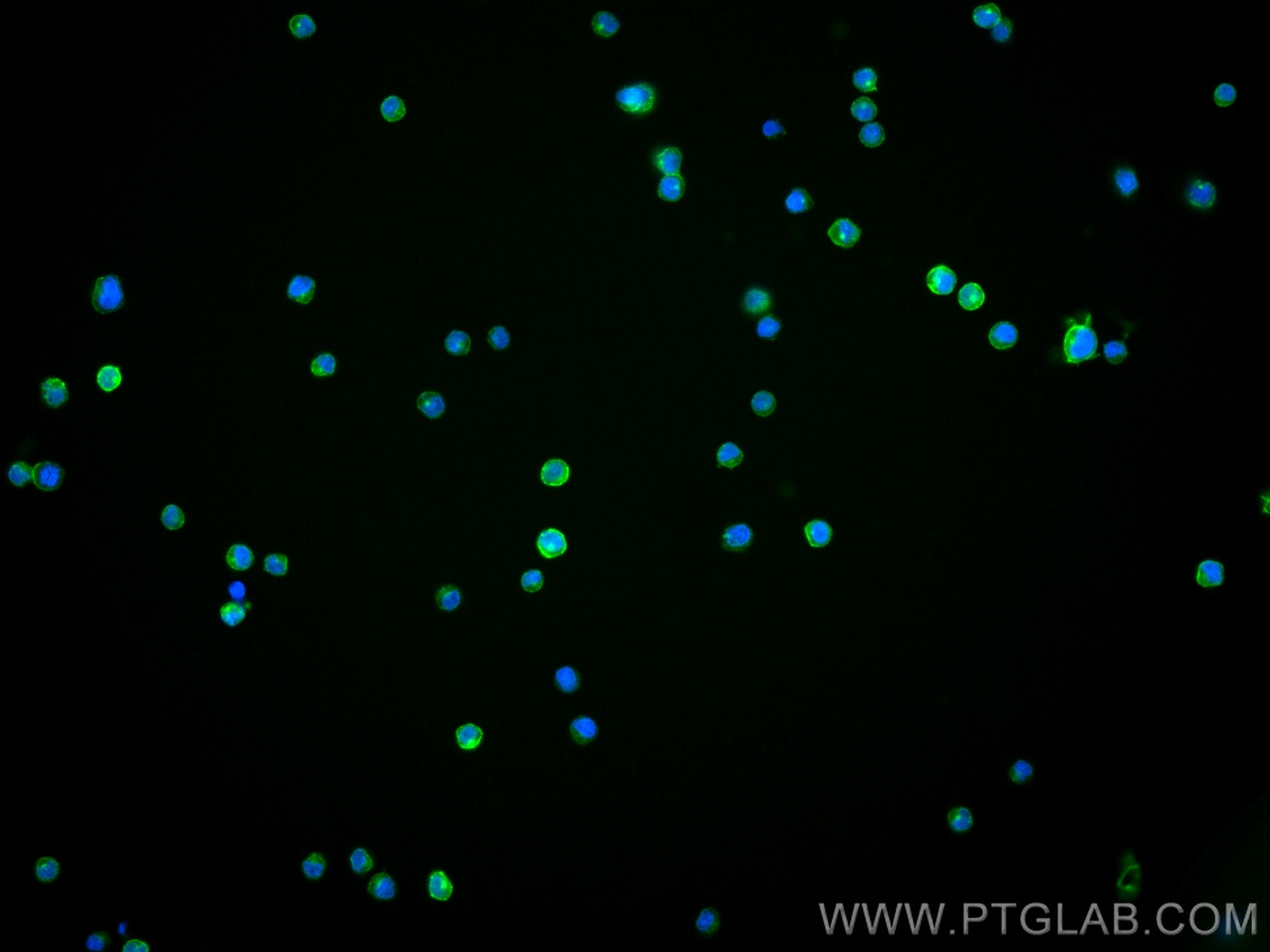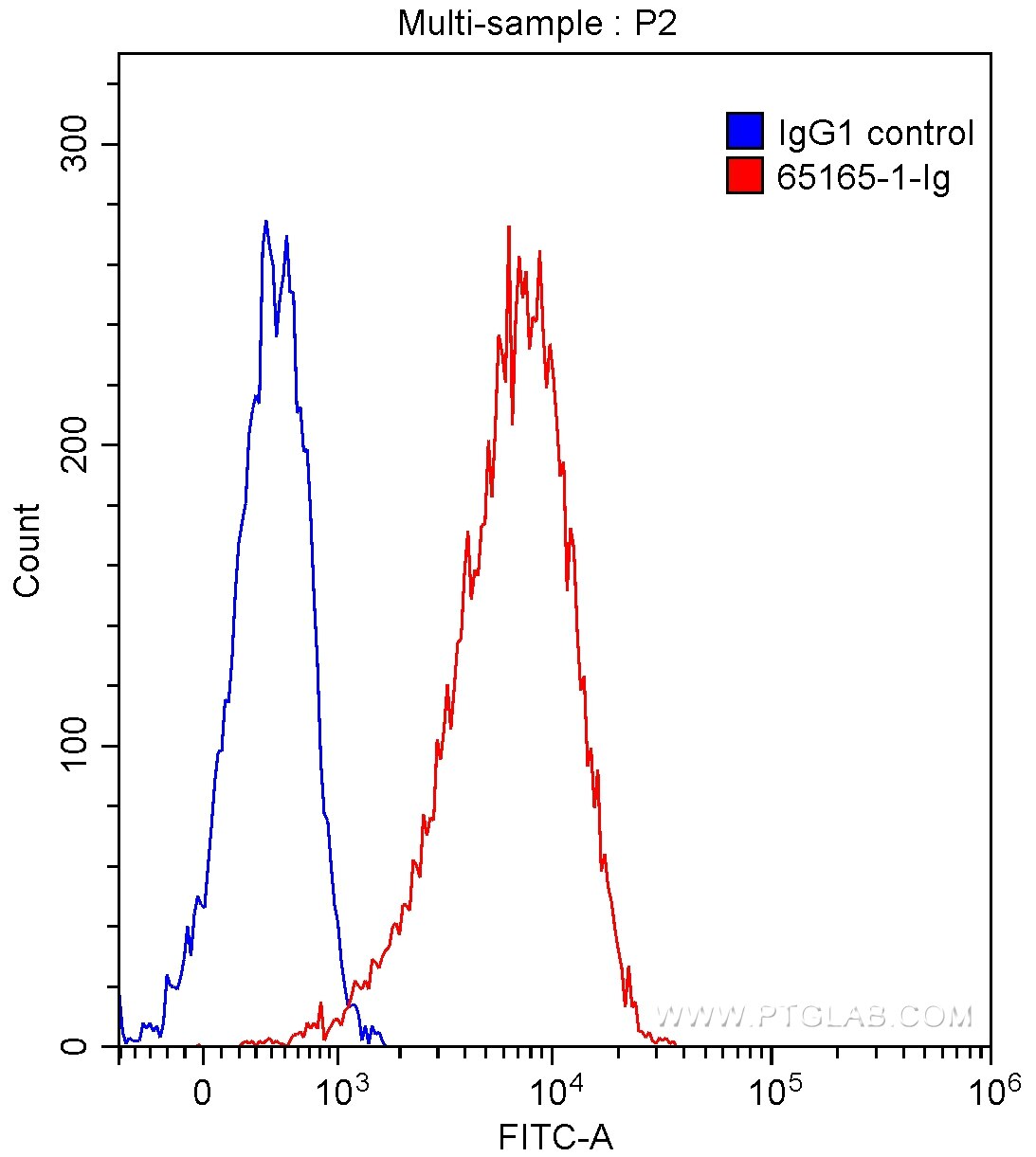Tested Applications
| Positive IF/ICC detected in | Raji cells |
| Positive FC detected in | Daudi cells |
Recommended dilution
| Application | Dilution |
|---|---|
| Immunofluorescence (IF)/ICC | IF/ICC : 1:500-1:2000 |
| Flow Cytometry (FC) | FC : 0.2 ug per 10^6 cells in 100 μl suspension |
| This reagent has been tested for flow cytometric analysis. It is recommended that this reagent should be titrated in each testing system to obtain optimal results. | |
| Sample-dependent, Check data in validation data gallery. | |
Published Applications
| IF | See 1 publications below |
| FC | See 2 publications below |
Product Information
65165-1-Ig targets CD86 in IF/ICC, FC applications and shows reactivity with human samples.
| Tested Reactivity | human |
| Cited Reactivity | human, mouse |
| Host / Isotype | Mouse / IgG1, kappa |
| Class | Monoclonal |
| Type | Antibody |
| Immunogen |
B-lymphoblastoid cell line ARH 77 Predict reactive species |
| Full Name | CD86 molecule |
| Calculated Molecular Weight | 329 aa, 38 kDa |
| GenBank Accession Number | BC040261 |
| Gene Symbol | CD86 |
| Gene ID (NCBI) | 942 |
| ENSEMBL Gene ID | ENSG00000114013 |
| RRID | AB_2881481 |
| Conjugate | Unconjugated |
| Form | Liquid |
| Purification Method | Protein G purification |
| UNIPROT ID | P42081 |
| Storage Buffer | PBS with 0.09% sodium azide, pH 7.3. |
| Storage Conditions | Store at 2-8°C. Stable for one year after shipment. |
Background Information
CD86 (also known as B7.2) is a costimulatory molecule belonging to the immunoglobulin superfamily. Primarily expressed on antigen-presenting cells (APCs), including B cells, dendritic cells, and macrophages, CD86 is the ligand for two proteins at the cell surface of T cells, CD28 antigen and cytotoxic T-lymphocyte-associated protein 4. Binding of CD86 with CD28 antigen is a costimulatory signal for activation of the T-cell. Binding of CD86 with cytotoxic T-lymphocyte-associated protein 4 negatively regulates T-cell activation and diminishes the immune response.
Protocols
| Product Specific Protocols | |
|---|---|
| FC protocol for CD86 antibody 65165-1-Ig | Download protocol |
| IF protocol for CD86 antibody 65165-1-Ig | Download protocol |
| Standard Protocols | |
|---|---|
| Click here to view our Standard Protocols |
Publications
| Species | Application | Title |
|---|---|---|
Mater Today Bio Engineering exosome membrane disguised thermal responsive system for targeted drug delivery and controlled release across the blood-brain barrier | ||
Int Immunopharmacol Isosilybin A exhibits anti-inflammatory properties in rosacea by inhibiting MAPK pathway and M1 macrophage polarization | ||
J Agric Food Chem Novel Collagen Analogs with Multicopy Mucin-Type Sequences for Multifunctional Enhancement Properties Using SUMO Fusion Tags | ||
Food Funct Ergosterol from edible fungi: Enhancing fatty acid oxidation via CPT1A to protect against diabetic kidney disease |
Reviews
The reviews below have been submitted by verified Proteintech customers who received an incentive for providing their feedback.
FH Paul (Verified Customer) (02-13-2025) | Works well for immunofluorescence. Clear signal in high expressing B cell line at 1/400 dilution.
|






